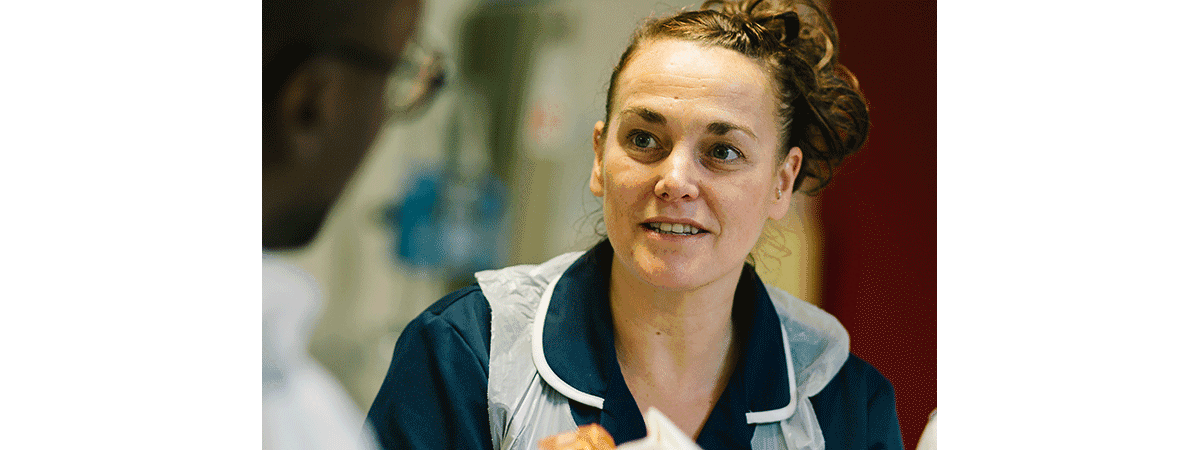
Opinion

We’ve been talking to Fiona Rich, Senior Lecturer in Learning Disability Nursing, to find out more about the fantastic work Learning Disability Nurses do to support some of the most vulnerable members of society.
There are lots of misconceptions about what Learning Disability Nursing is and what we do on a daily basis. In fact, some people don’t even know it exists! A common misconception is that learning disability nurses do not have, or need, the same clinical skills as adult nurses, yet many learning disability nurses administer medication via a PEG or NG Tube, give injections, provide wound care and even work in hospital wards. But we also do so much more than that!
The field of all fields
Learning Disability Nursing is often referred to as "the field of all fields". That’s because we can work with all sorts of people in many different circumstances: children, adolescents, adults and older adults; in areas such as palliative care, mental health, physical disabilities and the criminal justice system; and in settings such as schools, hospitals and the community.
Training as a Learning Disability Nurse opens up a wealth of opportunities to specialise in working with people with learning disabilities that affect them for their whole lives.
Want to know more about Learning Disability Nursing?
These are just five areas where learning disability nurses support people:
1. Learning Disability Liaison Nurse
Learning Disability Liaison Nurses usually work in a hospital making sure that patients with learning disabilities have the same access to healthcare that anyone else would. They make sure that a patient’s learning disability was not a barrier to them being able to engage with the treatment they need to receive.
People with learning disabilities may not understand why they are at the hospital, what they’re being treated for or what their treatment options are. They might have difficulty physically getting to the hospital in the first place. Going to the hospital, or a prolonged stay in hospital can be a very distressing situation, so this role puts the person at the centre of care and supports them through what might appear to anyone else as something really simple but is vital to the wellbeing of people with complex needs.
2. Child and Adolescent Mental Health Services
Specialist Learning Disability Nurses also support children and adolescents – along with their families – out in the community. Children who need this type of support might present with behaviour that is seen by others as challenging. The label of ‘challenging behaviour’ is often a way of the person communicating their pain or distress in the only method available to them at the time.
Learning disability nurses use their observational and communication skills to help get to the root cause of this behaviour and facilitate community involvement through teaching other ways to communicate, often in combination with reducing any external/environmental stressors. They support young people and their families in managing the co-existence of a learning disability and a mental health condition within the family and school setting.

3. Mental Health Nurse
It’s common for people to have a dual diagnosis of a learning disability and a mental health condition. Often this is accompanied by communication difficulties too. Considering the most beneficial therapy in terms of mental health is the use of talking therapies, people with a learning disability need to be able to access a specialist nurse who can ensure that all resources and communication is adapted to the patient’s communication level and make appropriate adjustments to ensure the treatment is successful. Part of a learning disability nurse’s role is to find ways around the communication barriers to ensure people can access the therapy they need for their mental health.
4. Forensics
Learning disability nurses can work in specialist community forensic nursing teams supporting people with learning disabilities who have gone through the criminal justice system. They can also support people in a forensic setting in specialist hospitals, such as Rampton, in a clinical service such as the National High Secure Learning Disability Service. Learning disability nurses work with people who are undergoing evidence-based psychological interventions in multi-disciplinary care environments. Patients will have been assessed as needing treatment under conditions within a high secure environment. Many will have come via the Criminal Justice System. Most admissions will be under Part III of the Mental Health Act, either from the court, from prison or a medium security unit.
5. Community Nursing
Learning disability nurses can also work as community nurses, working as an autonomous practitioner and managing your own caseload. They can also be work as a specialist nurse and support people with learning disabilities in the community in a specialist role, such as epilepsy specialist nurse or challenging behaviour specialist nurse. In this situation, Learning disability nurses are key to helping people to live with the best health possible in the community and would liaise with other professionals within multi-disciplinary teams.
These five things are of course just a small percentage of the roles Learning Disability Nurses can play to support the health and wellbeing of some of the most marginalised members of our communities.
Find out more about being a Learning Disability Nurse on our course page and and follow our Learning Disability Nursing team on Twitter @BCU_LDnursing




